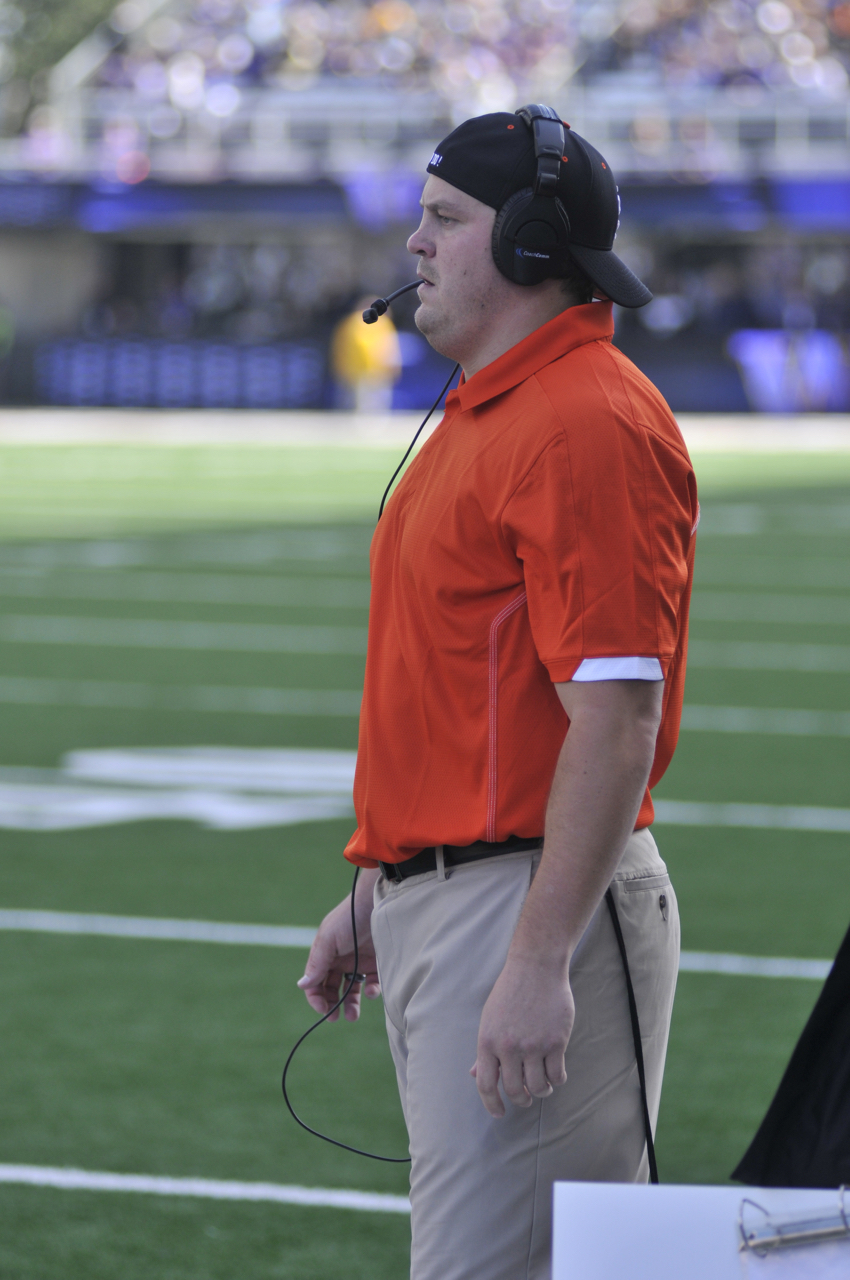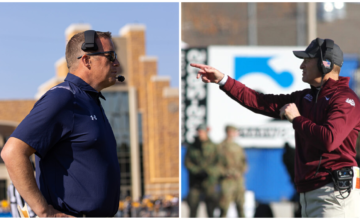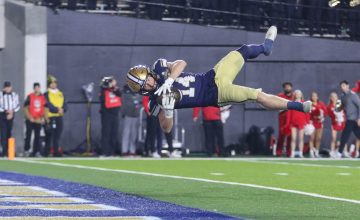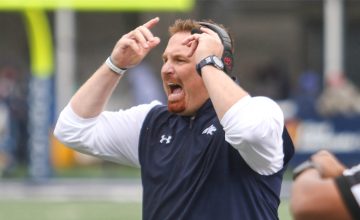As a boy in Port Orchard, Washington, Roger Cooper remembers writing in a time capsule to be found in the future his aspirations for life. The budding athlete would either grow up to become a dinosaur or play in the NFL.
“Being a dinosaur didn’t work out so well,” Cooper laughed on Tuesday.
Playing in the NFL, however, was Cooper’s reality for a brief time. After earning first-team All-Big Sky Conference honors three years in a row and capping his Montana State career with league defensive MVP honors in 2004, Cooper bounced around professional football for a few years. He spent stints with the Dallas Cowboys, San Francisco 49ers, San Diego Chargers and Frankfurt Galaxy of NFL Europe between 2005 and 2007.
But a fractured wrist cost him his career and nearly cost him his sanity. He tried to hide the injury. He tried to play through it. But the 6-foot-3, 240-pound swift outside linebacker’s career came to a sudden halt.
“I felt like I had failed,” Cooper said. “I wasn’t who everyone thought I was. They would say, ‘At least you had a chance.’ I would think, ‘I’d still be playing if I didn’t get hurt.’ It bothered me.”
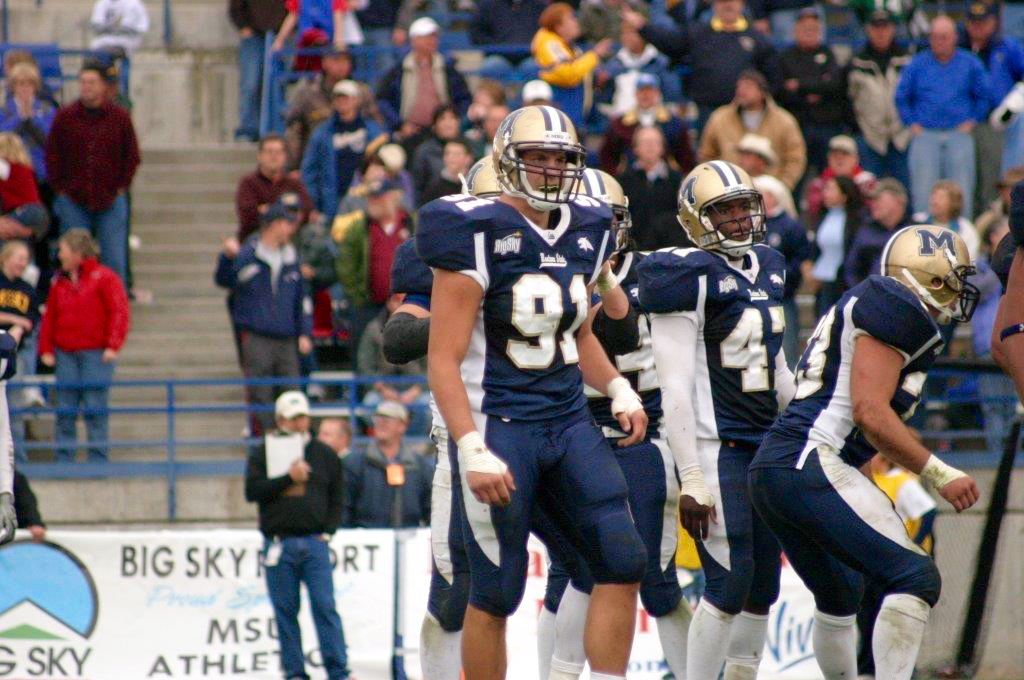
Montana State linebacker Roger Cooper, the 2004 Big Sky Defensive MVP/ by Tina Haines, MSU athletics
When his dreams of NFL football died, Cooper moved back to Bozeman. He went into the building industry for a short while because football “made me sick”. In 2008, his then-girlfriend and now wife Jessica scored him an interview to become part of Bozeman High School’s coaching staff. He landed the gig. In 2010 as the defensive coordinator, Cooper helped the Hawks win their first state title since 1917.
The abrupt injury turned him off from the game but his longing for competition brought him back. His foray into the Montana prep scene led him to where he is now.
After helping Heath Hunter earn Class AA Defensive Player of the Year honors during Bozeman’s state title run, Cooper jumped back into the college ranks. He spent 2011 as a volunteer assistant at Montana State before his former MSU head coach Mike Kramer hired him to coach running backs at Idaho State the next fall.
Cooper now enters his sixth season at Idaho State. The former Bobcat All-American served as ISU’s co-defensive coordinator in 2013 and 2014. In 2015, he was ISU’s assistant head coach for the defense. Last season, he coached linebackers and served as Idaho State’s associate head coach, the role he currently holds.
Last winter, Cooper was inducted into the Montana State Hall of Fame. On Saturday, he and the Bengals will return to Bozeman for the first time since 2014 to take on Montana State.
“It’s exciting to go back and playing in that stadium is cool,” Cooper said. “…It will be good to be back in that stadium. It’s always a great atmosphere so I’m excited for our kids to go up there and see that and be a part of such a great game day Saturday.”
As a senior at South Kitsap High School, Cooper was an 1,800-yard running back and a state champion hurdler. He scored 20 touchdowns as a tailback and ran 14.14 seconds in the 110 high hurdles, one of the top times in the country and the school record at his prep alma mater nearly 20 years later.
He earned designation from the Seattle Times as one of the top 10 prospects in the state of Washington. He committed to Washington shortly after his senior season ended.
“I’ve heard a lot of stories but somehow, they say my SATs were in the (NCAA) clearinghouse and they have to grey shirt me,” Cooper said. “So I start calling all the schools I’d talked to. I start talking to all the Pac 12 schools and some of the smaller D-I schools.
“Then Coach Kramer flew Coach (Pete) Kwiatkowski in.”
South Kitsap’s head coach at the time, D.J. Sigurdson, told Kramer — Sigurdson’s former head coach during Kramer’s tenure at Eastern Washington — of Cooper’s falling out with the Huskies. Six days before National Signing Day, Kramer put Kwiatkowski, then MSU’s defensive coordinator and now in the same role at Washington, on a plane to Seattle.
Cooper returned on the flight back to Bozeman with Kwiatkowski for an official visit. He met a collection of players — MSU signed nearly 40 guys in February of 2000 heading into Kramer’s first season — and fell in love with Bozeman, albeit not right away.
“I remember my first day there on my recruiting trip and it was two degrees and windy and I literally thought I was going to die,” Cooper said with a chuckle. “I vividly remember that. Meeting all the guys, it was such a big recruiting class — that year, they brought in almost 40 guys — and we all signed on together and said, ‘Let’s do this.’”
That first fall in 2000, Montana State did not win a game. But the potential of what might be in store was on display daily in practice.
“I remember us being on scout team and whooping the offense’s ass,” Cooper said. “They actually told us to slow down.”
“When we get to fall, I’m running the offense but really, I’m running the defensive scout team,” Kramer said. “We had a bunch of guys who were on our defensive scout team and they were about as good as anybody we would play that year…Those guys whipped us. You could see that Roger would be some sort of dude.”
Those whippings continued on Saturdays for the Bobcats. Montana State went 0-11 in Kramer’s first season.
“We would be sitting in the dorm rooms listening to the games and we sat in that room and made a pact that this wasn’t us, that we were going to change this,” Cooper said. “Through great guidance of the coaches at the time, Coach Kramer, Coach Kwiatkowski, Coach Bailey, we kind of just decided that wasn’t going to be who we were. Everyone bought in”
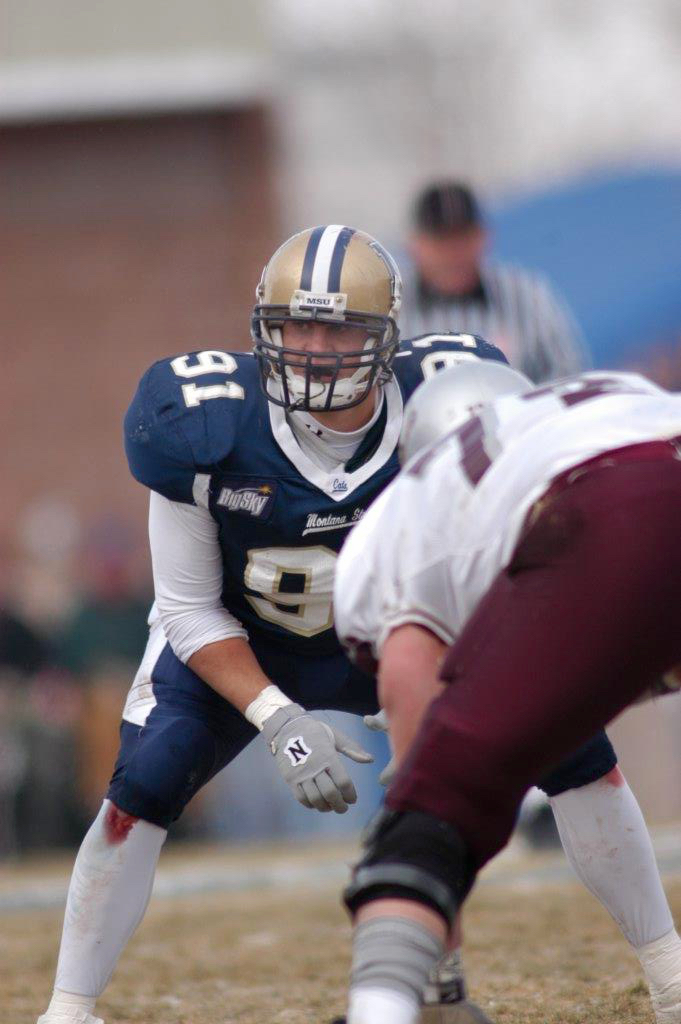
Former Montana State linebacker Roger Cooper against Montana/ by R. Dean Hendrickson, MSU athletics
Kramer remembers his team’s mid-season matchup with Washington State Cooper’s redshirt freshman year in 2001 vividly. Cooper was still a year away from assuming a starting position but he played in spot situations and on special teams. Kramer remembers even dialing up a play against Wazzu to give Cooper the ball on a reverse on a kick return
The following season, Cooper’s first as a starter, the Bobcats played the Cougars again in the fourth game of the season. On a pass rushing down, Kwiatkowski brought Cooper off the edge on a designed blitz. Washington State Heisman candidate quarterback Jason Gesser surely thought he could evade a Big Sky linebacker, especially one in his first year as a starter.
“He was like a leopard or a cheetah chasing a gazelle,” Kramer said. “When he started tracking Gesser — at that time, they were 7th in the nation, 5-0 — but when Coop started tracking him, you could tell he was going to run him down and something bad was going to happen.
“I think Jason thought he could out run a Big Sky linebacker. Not only could he not but he hit him so hard, Gesser ended up under their bench on the sideline. It took a long time for him to get up.”
That Bobcat team finished 7-6 by leading the league in total defense. MSU stumbled to a 2-4 start after winning just five games in two years under Kramer. But MSU won five of six down the stretch, including a historic 10-7 win in Missoula over Montana to snap UM’s 16-game streak over its fierce rival.
Cooper individually dominated. He registered 63 tackles and 20 tackles for loss. He ranked in the top eight in the Big Sky with three interceptions and 10 passes defended.
That was only the beginning. In 2003, Cooper piled up 96 tackles, 17 tackles for loss, 3.5 sacks, forced two fumbles and recovered another. He earned first-team All-Big Sky honors for the second straight year. MSU beat UM 27-20 in Bozeman, helping to share the Big Sky crown and qualify for the playoffs for the second straight season after a 17-year absence.
“I think they call it swagger these days,” Cooper said with a laugh when asked about the identity of a defense that also included All-American safety Kane Ioane along with memorable Bobcats like cornerback Joey Thomas, defensive ends Jon Montoya, Beau Clark and Adam Cordeiro and defensive tackle Ray Sebestyen. “We really took the field with confidence. No matter what the score was, win or lose, people were going to walk away from the game and go, ‘WHO were those guys? Why were they so physical?’ I think that’s why we won a lot of games just by being physical and maximum effort.”
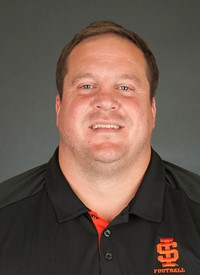
Roger Cooper
In 2004, the Bobcats lost three straight down the stretch to miss the playoffs. But Cooper’s 68 tackles, 14 tackles, four sacks and three forced fumbles helped him become the second straight Bobcat — Kane Ioane won the award in 2003 — to earn Big Sky Defensive MVP honors.
“From the first day he stepped on campus until his last play, he was nothing short of everything he’s got, ever down, all the time,” Kramer said. “…He was a perfect fit for what type of guys we had, what type of guys we wanted to have, the kind of guy you wanted to coach.”
After Montana State’s 2011 Big Sky championship season, Cooper hoped for a spot on Rob Ash’s full-time coaching staff. But Ioane already had the linebackers coach job locked down and Jamie Marshall was a stalwart as Ash’s defensive coordinator.
Kramer was fired amidst a slew of controversy following the 2006 season. Idaho State hired him for a massive rebuilding project in 2011. In 2012, Kramer gave Cooper his first Division I coaching gig.
Cooper’s authority of calling the defense and his specific role on the coaching staff has fluctuated over the last six years. When Idaho State abruptly forced Kramer out at Idaho State, new head coach Rob Phenicie retained Cooper as his linebackers coach and associate head coach.
“I constantly hear from Coop during the game on the headphones him calling out the play before it happens,” Phenicie said. “And it almost always happens.
“The kids respect him tremendously. He’s a very good recruiter, great evaluator. Cooper is just a solid, solid person.”
Since 2014, a year that saw Kramer lead the Bengals to 8-4, the best mark ISU had posted in more than a decade, Cooper mentored Mario Jenkins to Big Sky Freshman of the Year honors. Three years, a blown out knee, a foot injury, a hand injury and now a massive brace on Jenkins’ elbow later, the senior captain is on the Buck Buchanan Award watch list because he’s one of the nation’s most prolific tacklers.
“He’s a great person to talk to about that stuff,” Jenkins said. “He would always say, ‘It’s just another speed bump in the road. You just have to get over it. It’s small and you will come back even stronger.’ He was always there to uplift me and give me advice.
“He’s passed on so much, different schemes, how to read film. He was great with play recognition coming off the edge and banging people. He was a great player overall and he has helped me become one like him.”
Kramer sees parallels between two of his most talented pupils. Krmaer identifies two elite athletes with great range, significant talent and “diverse interests.”
“The thing about Roger is he was a photography major. He’s not a knuckle dragging, snot-bubbling guy who majors in whatever to keep him going. He’s artistic. He’s got tremendous visionary talent. He’s a rare combination for a guy who plays a position that requires an element of violence and someone who is creative.
“The way his linebackers are playing is an example of how versatile a brain that kid has. He had it at Montana State and he continues to show that.”
Cooper has carved out a distinct reputation as a player and now a coaching in the Big Sky Conference. But the seeds he sewed at MSU continue to provide bounty as Idaho State makes its way back to Bozeman for the first time since 2014 and just the second time in Cooper’s coaching career.
“We still say a few things today at Idaho State from back then and as player, there’s only so much you can control but as a player, you can control your attitude and your effort,” Cooper said. “That’s something you have maximum control over that you can maximize your role on the team. Do your 1/11th and if everyone is doing that, the outcome should be pretty good. I learned that at Montana State.”

